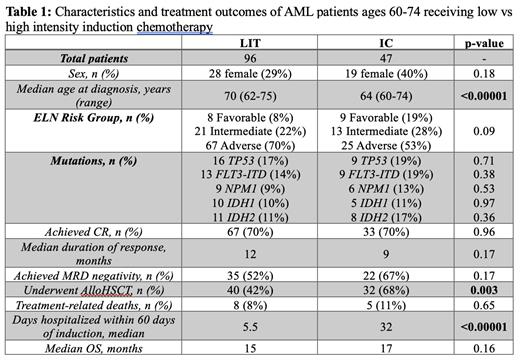Introduction
Clear standards of care exist for patients with AML under the age of 60 who are eligible for intensive chemotherapy (IC), as well as for patients over the age of 75 or who are unfit for IC. Fit patients between the ages of 60-74 have historically been understudied, but have lower rates of remission and increased rates of toxicity with intensive regimens compared to younger individuals with AML. We sought to evaluate treatment patterns and outcomes in this patient group.
Methods
We performed a single-center, retrospective analysis of consecutive patients ages 60 through 74 years at the time of their AML diagnosis who received frontline therapy between April 2018 and September 2022. Low intensity therapy (LIT) regimens included combinations of a hypomethylating agent, low dose cytarabine, venetoclax, cladribine, and/or targeted agents. IC regimens included an anthracycline and higher-dose cytarabine-based regimens (≥1g/m 2) +/- targeted agents. Clinical and genomic data including patient demographics, laboratory results including bone marrow pathology and mutational data, treatment responses, and allogeneic hematopoietic stem cell transplantation (HCT) data including conditioning regimen and donor type (when applicable) were abstracted from the medical record. Minimal residual disease (MRD) status was assessed by multi-parameter flow cytometry with a sensitivity of 0.02%. The statistical analysis was performed using R 1.
Results
143 patients were included in the analysis; 47 (33%) received front line IC, and 96 (67%) received LIT. Baseline characteristics are shown in Table 1. Patients receiving IC were younger, more likely to be female, and more likely to have a favorable ELN risk stratification 2, but otherwise balanced. The percentage of patients receiving IC remained the same in each calendar year.
Patients in the IC and LIT groups had similar rates of complete remission (CR; 70% vs 70%, respectively, p = 0.96). Among those achieving CR, 22 (67%) patients in the IC group achieved MRD-negativity vs. 35 (52%) in the LIT group (p = 0.17). The median duration of remission was 9 months in the IC group and 12 months in the LIT group (p = 0.17). The median overall survival (OS) was 17 months for IC and 15 months for LIT (p = 0.16). For patients harboring FLT3-ITD, IDH1, IDH2, or TP53 mutations, there was no difference in OS based on receipt of either IC or LIT, nor was there any difference in OS according to ELN 2022 risk category.
A significantly higher proportion of patients who received IC underwent HCT (68% vs 42%, p = 0.003). In both groups, OS was significantly longer for patients who received HCT. Treatment-related mortality (TRM) was comparable in each group, with 5 (11%) and 8 (8%) deaths in IC vs. LIT, respectively. The median number of days hospitalized within the first 60 days after induction therapy was notably different at 32 days for IC and 5.5 days for LIT (p < 0.00001), with 34 (35%) LIT patients who had 0 days of hospitalization post-induction compared to IC patients who universally were hospitalized as part of their induction treatment plan.
Conclusion
In our cohort, patients with AML between the ages of 60-74 had comparable rates of CR, MRD negativity, duration of response, and overall survival whether treated with IC or LIT, with no difference when stratified by mutational status or ELN risk. Intensively-treated patients were younger and more likely to receive HCT but both groups had an OS benefit from HCT. Our data suggest that in the era of novel agents such as venetoclax, less intensive induction strategies may be appropriate for IC-eligible patients between the ages of 60-74.
References
1R Core Team (2021). R: A language and environment for statistical computing. R Foundation for Statistical Computing, Vienna, Austria. https://www.R-project.org/.
2Döhner H, Wei AH, Appelbaum FR, Craddock C, DiNardo CD, Dombret H, Ebert BL, Fenaux P, Godley LA, Hasserjian RP, Larson RA, Levine RL, Miyazaki Y, Niederwieser D, Ossenkoppele G, Röllig C, Sierra J, Stein EM, Tallman MS, Tien HF, Wang J, Wierzbowska A, Löwenberg B. Diagnosis and management of AML in adults: 2022 recommendations from an international expert panel on behalf of the ELN. Blood. 2022 Sep 22;140(12):1345-1377. doi: 10.1182/blood.2022016867. PMID: 35797463.
Disclosures
Fakhri:BeiGene: Consultancy, Membership on an entity's Board of Directors or advisory committees; AstraZeneca: Consultancy, Membership on an entity's Board of Directors or advisory committees; Abbvie: Consultancy, Membership on an entity's Board of Directors or advisory committees, Research Funding; ADC Therapeutics: Consultancy, Membership on an entity's Board of Directors or advisory committees; BMS/Juno: Consultancy, Membership on an entity's Board of Directors or advisory committees; Genetech: Consultancy, Membership on an entity's Board of Directors or advisory committees, Research Funding; Genmab/Abbvie: Consultancy, Membership on an entity's Board of Directors or advisory committees, Research Funding; LOXO/Lilly: Consultancy, Membership on an entity's Board of Directors or advisory committees, Research Funding; Pharmacyclics: Consultancy, Membership on an entity's Board of Directors or advisory committees, Research Funding. Liedtke:Kite: Other: Participation on a Data Safety Monitoring Board or Advisory Board; Seagen: Other: Grants or contracts; Janssen: Other: Grants or contracts; Participation on a Data Safety Monitoring Board or Advisory Board; Caelum: Other: Grants or contracts; BMS: Other: Grants or contracts; Participation on a Data Safety Monitoring Board or Advisory Board; Allogene: Other: Grants or contracts; Abbvie: Other: Grants or contracts; Adaptive: Other: Participation on a Data Safety Monitoring Board or Advisory Board. Shomali:Incyte Corporation: Consultancy, Membership on an entity's Board of Directors or advisory committees, Research Funding; Blueprint Medicines Corporation: Consultancy, Membership on an entity's Board of Directors or advisory committees, Research Funding. Zhang:Stanford University: Current Employment; Abbvie: Consultancy; Rigel: Consultancy; Servier: Consultancy; Bristol Myers Squibb: Research Funding. Mannis:Stemline: Consultancy; Genentech: Consultancy; Abbvie: Consultancy; BMS/Celgene: Consultancy; Astellas: Consultancy; Macrogenics: Honoraria; Agios: Consultancy.


This feature is available to Subscribers Only
Sign In or Create an Account Close Modal